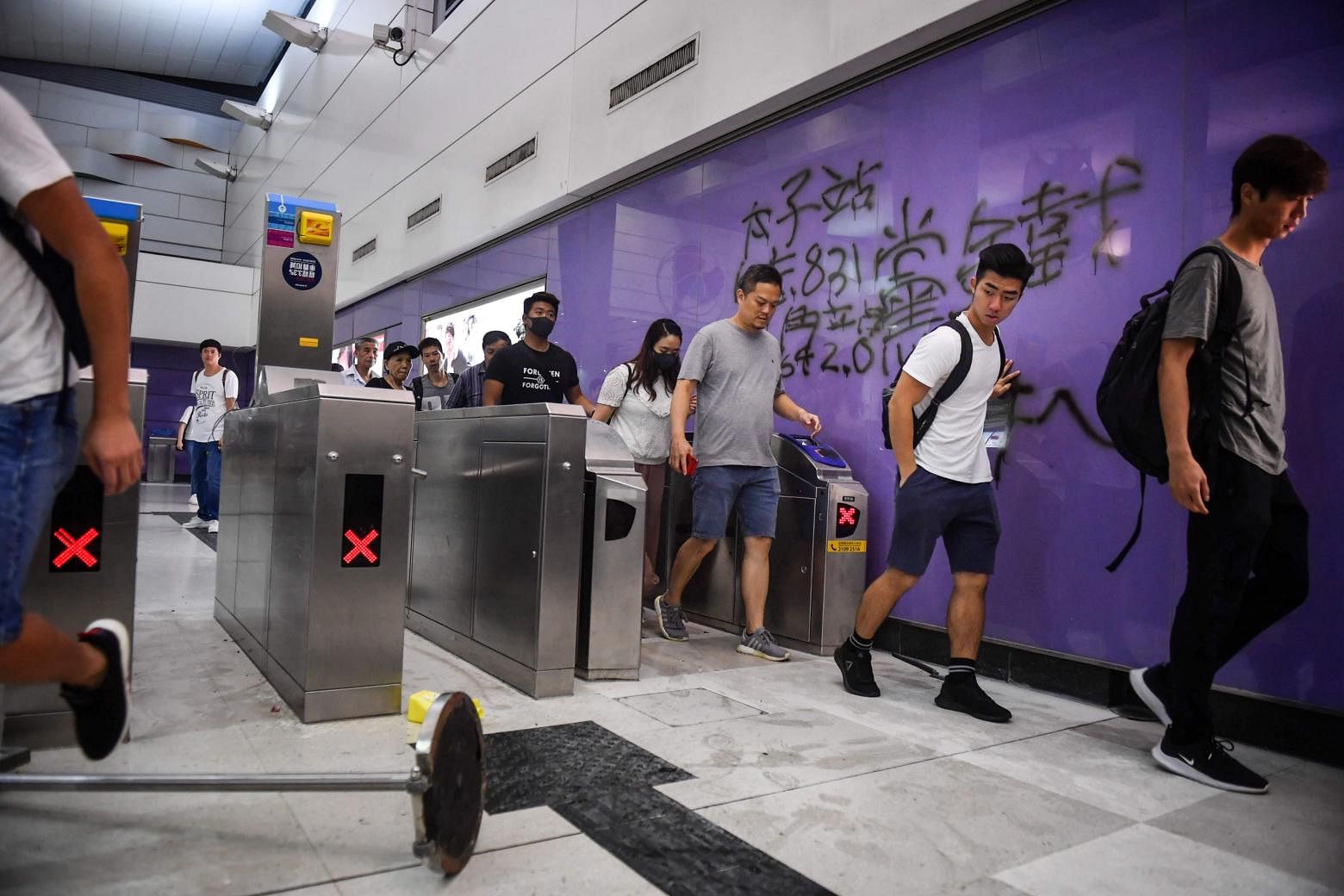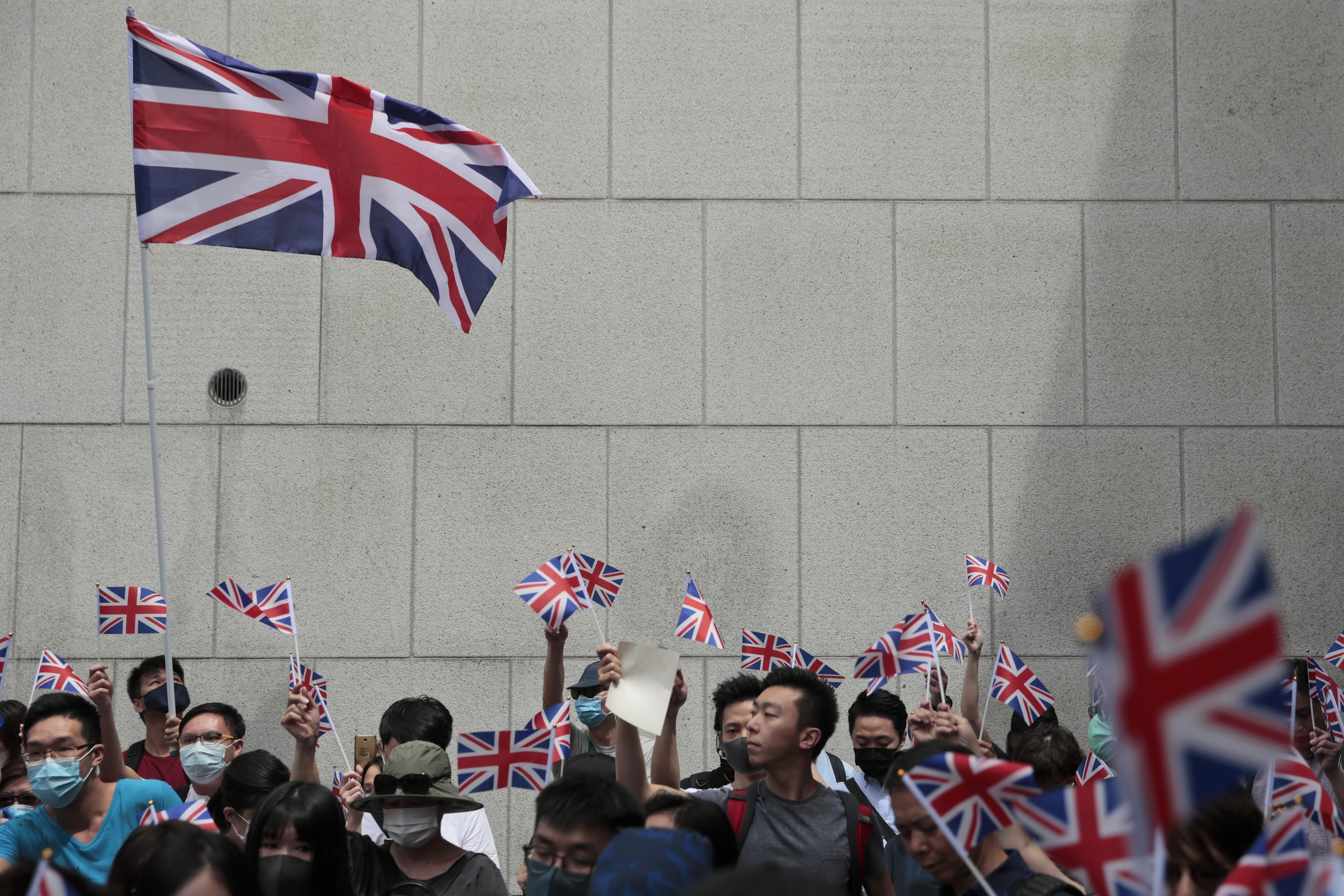Hong Kong protesters trash MTR stations after paralysing transport to airport
Sign up now: Get insights on Asia's fast-moving developments
Follow topic:
HONG KONG - Protesters on Sunday (Sept 1) turned their attention to two metro stations, first in Tung Chung near the airport, and later at Sha Tin in the new territories, having earlier "stress tested" the aiport's operations.
Local TV footage showed black-clad protesters destroying station facilities at the Tung Chung station. They smashed the glass panes of the customer service centre, ripped apart the station turnstiles, and broke the ticket machines in the station, which is located near Citygate Outlets, a mall popular with tourists. Before leaving, some also flooded the station's concourse with a firefighting hose.
Demonstrators have directed their ire at the rail operator since it acquired a court injunction banning protest activities in its stations and trains. It follows criticism from Chinese state media who accused the MTR Corporation of being soft on protesters and providing special trains to help them leave protest sites.
Protesters had previously used the city's hyper-efficient train system to travel between districts, allowing them to regroup in various districts, a physical manifestation of their "be water" philosophy.
The protesters also dismantled CCTV cameras in the station and damaged firefighting facilities, said police on Facebook.
"Some radical protesters blocked multiple roads in Tung Chung, set fire to barricades and a national flag," the policed added.
Shortly after the chaos broke out at the station, announcements were made telling train commuters to leave the premises immediately, with an alarm ringing incessantly in the background. Among the commuters were families with young children.
The station was shut in the mid-afternoon and train services on the Airport Express and the Tung Chung lines - near parallel routes that link Lantau Island, where the airport is located, to the city centre - were suspended until past 10pm.
Protesters who were unable to leave on trains walked out of Tung Chung on a highway, took ferries, or packed buses leaving the area, even sitting on luggage racks.

Protesters smash equipment in Tung Chung MTR station near Hong Kong International Airport in Hong Kong on Sept 1, 2019.
PHOTO: EPA-EFE
Some later regrouped at Sha Tin station, where they also trashed the control centre and damaged turnstiles, before gathering in the adjacent New Town Mall - the site of a bloody confrontation between demonstrations and police some seven weeks ago - where they shouted protest slogans before dispersing.
News footage showed police waiting for passengers at the Central Ferry Pier in the city centre, where those arriving from Mui Wo or Discovery Bay - piers close to Tung Chung - had their bags searched.
Earlier in the afternoon, anti-government protesters tried to "stress test" the Hong Kong International Airport's operations, despite a court order that bans moves that would disrupt airport operations.
The number of protesters swelled from the initial hundreds to thousands, who thronged Tung Chung after leaving the airport.
These come ahead of a planned two-day strike from Monday - the second such call after Aug 5, when protests were held in multiple districts and later turned violent and chaotic.
Rallies in Tamar Park in Admiralty on Monday and Tuesday have been given the go-ahead by the police, while the appeal board rejected an application for a rally in Tsim Sha Tsui on Monday that was due to coincide with the strike and class boycott.
From 1pm on Sunday, many demonstrators had heeded calls on social media to gather at bus stations near the airport.
At about 2pm, they started to drag water-filled barriers, tip over rubbish dumpsters and move luggage trolleys to block roads around the airport at Sky City Interchange and Chek Lap Kok South Road.
"They also hurled objects at police officers and Airport Authority staff. The protesters concerned are participating in an unauthorised assembly," the police said in a statement on Sunday.
It added that as a court injunction order is in force, the protesters may be liable for "contempt of court".
Videos circulating online showed that those who made it into the airport were playing games of "hide and seek" and "cat and mouse", with officers hot on their heels while travellers and passers-by watched intently or filmed the chase.
By about 4pm, traffic towards the airport ground to a halt with long lines of vehicles stuck in the jam and drivers standing by the road. Television footage showed a man who had to catch his flight take his luggage out of the boot and walk to the airport instead.
Later, other travellers and airline crew were pictured rolling their luggage on the road to get to their flights.
Given a police warning that they would conduct dispersal operations soon, protesters started leaving the airport shortly before 4pm. Along the way, they built more barricades to slow the police and chanted "hak geng, wan ahn" or "corrupt cops, return the eye" and "five demands, not one less".
Train services on Sunday to the airport were initially slowed deliberately upon request by the government and Airport Authority to control the traffic but the Airport Express services were later suspended in both directions.
The earlier slower train services to the airport came after a small number of protesters were seen entering the Airport Express' Tsing Yi station to spray paint on CCTV cameras and vandalise card readers, broadcaster TVB reported.
Check-in services at Hong Kong MTR station and Kowloon MTR station were suspended, the train operator said on Twitter.
TV footage showed many passengers stuck at the airport after landing in Hong Kong, with dozens going on foot to get out the the area as protests paralysed traffic.
Meanwhile, a large group of protesters hurled numerous iron poles, bricks and rocks onto the Airport Express train track near the Airport Station, the police said. Some of the protesters even trespassed on the track and seriously obstructed train services.
Demonstrators aimed to choke travel routes to the airport on Sunday and possibly disrupt flights a day after pitched street battles between police and masked protesters that spread to more than 10 districts on Hong Kong island and in Kowloon, making this the 13th consecutive weekend of escalated and mostly violent protests since June 9.

The so-called "stress test" of the airport was conducted last weekend and failed to gain momentum. It came after the airport was shut three weeks ago and hundreds of flights had to be cancelled or delayed after protesters flooded the airport.
A check on the airport's website on Sunday found that some flights, mostly linked to Cathay Pacific or Cathay Dragon and Air China, were cancelled.
Separately, some protesters gathered outside the British consulate on Sunday, to urge Britain to confirm that China had violated the Sino-British Joint Declaration by not granting democracy to Hong Kong, and for Britain to grant full citizenship to British National (Overseas) passport holders.
In a media briefing on Sunday evening, the police said 63 people, aged 13 to 36, were arrested at Prince Edward station last night. Fifty-four are men and nine women. The suspects face charges ranging from possession of weapons to illegal assembly.
The youngest, a 13-year-old, was found to have petrol bombs and lighters, which officers described as "very dangerous objects".

On Saturday, a policeman opened fire twice with live rounds as a warning after he came under attack - the second such incident in a span of a week. The plainclothes officer was believed to have resorted to his service revolver after he was set upon by protesters in Causeway Bay and fired two shots into the sky, local media had reported.
The incident occurred late at night after hours of multiple street battles between demonstrators and the riot police who rolled out water-cannon vehicles and tear gas to disperse the crowd.
This came after police last Thursday rejected an application for a march to Beijing's liaison office in Western District, citing safety reasons.
But thousands of demonstrators, young and old, ignored the ban on Saturday and took over key thoroughfares in Causeway Bay, Wan Chai, Admiralty and Central, paralysing traffic in the afternoon.
The demonstrations later spread to the Kowloon side and, at one point, officers stormed a train carriage at Prince Edward MTR station, hitting people inside with batons and firing pepper spray.
It was not clear if all the people in the train were protesters.
Angry crowds then gathered outside Prince Edward and nearby Mongkok stations, where police said they made arrests after protesters vandalised the customer service centre and damaged ticket machines.
At a media briefing in the wee hours of Sunday, senior superintendent Yolanda Yu said the police entered the station after the MTR Corporation called for help. The force was informed that protesters at the station were getting into arguments and fighting with a number of passengers, according to broadcaster RTHK.

She said that 40 people were arrested on suspicion of obstructing police officers, unlawful assembly and criminal damage.
Two train stations - Prince Edward and Mongkok - remained closed on Sunday for safety reasons.
More than 30 people were sent to the hospital after Saturday's clashes, with more than half discharged as of 8am on Sunday.
Saturday marked the fifth anniversary of a decision by the standing committee of China's legislature that ruled on Aug 31, 2014 that Hong Kong residents could elect their leader directly, but that the candidates would have to be approved by a nominating committee.
The decision triggered a 79-day long Yellow Umbrella movement that paralysed major streets in the financial district and other parts of the city.
The current anti-extradition protests that have now spanned five months, were sparked after the government mooted a controversial Bill - now suspended - that would allow the authorities to extradite people to jurisdictions which Hong Kong has no formal extradition agreements with, including mainland China.
But they have since morphed into a broader movement seeking five goals - universal suffrage, an independent inquiry into alleged police brutality, the release of all who have been arrested so far, the removal of June 12 protest as a "riot" and the complete withdrawal of the Bill.

